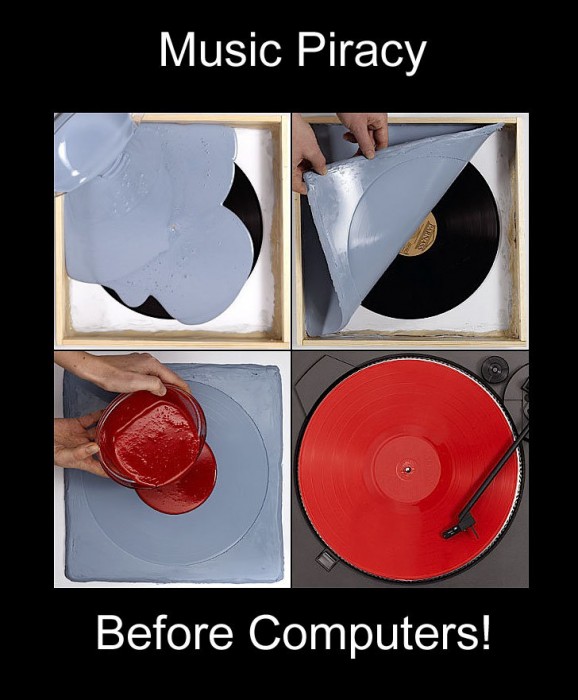Why is it that music files were the first ones that were widely pirated, yet now account for ~3% of files downloaded in a recent survey? Bandwidth – or more to the point, convenience! But as internet access speeds and download methods have evolved people are downloading movies and games and other massive files more frequently than music.
For a long time folks in the RIAA and MPAA and other related media industry groups have keyed on THAT – the ever-increasing ease of piracy – as a route to eliminate piracy by making it inconvenient / uncomfortable for pirates. Their methods have included adding DRM, prosecuting casual pirates, seeding virus-containing files to known pirate sites, adding rootkits / spyware to files, and so on. As you might note, these things are about punishment – tracking down folks to punish them for these actions, in some cases trying to leverage individual tracks for $80,000!
Even amongst anti-piracy zealots like myself, the draconian tactics used by the RIAA and MPAA have won few fans. Because while we might support their right to protect their property, the end result is too often that legal, paying customers get treated like criminals while pirates simply remove protections and enjoy unabated.
As an example, last week I installed a new computer game. The game used Steam, which is itself a DRM wall. I had to enter a serial number to activate the game on Steam. That is all normal. But when I tried to start the game I had to enter the same number again in order to go through a separate online activation. This activation process required me to create an account on the developer’s website. That activation process then required me to enter personal information for security purposes and get through a ‘captcha’ code system. Then it sent an activation message to my email account that I had to click on and get redirected to their website again to see that my account was successfully created. Now I could go back and try to start the game again through Steam, and only after confirming my successful account creation by having me login through the game again did it let me actually PLAY THE GAME!
Now a new service is trying to do pretty much the same thing – decrease piracy by making it less convenient. TuneSecure has developed software to crawl the internet and find IP addresses of people using P2P (peer-to-peer) file sharing sites in order to track illegal piracy with the intent of sending ‘please stop’ letters to the sites. According to a News.com article:
“Every time somebody logs on to a P2P network, does a search and then downloads an album that is protected — your IP network is exposed,” he told news.com.au.
Mr Erwin said the program also targeted the hundreds of file locker websites used by the internet community to store pirated songs and albums.
“We would find protected artists and albums on these particular services and request to have them removed, as well as constantly monitor the source in case somebody decides to upload the same album again,” he said.
TuneSecure says their intent is not to go after small-scale traders, instead using the intelligence their program offers to help stop things at the source:
“I’ve seen it done before in the states, attacking and going after mums and dads and saying ‘stop downloading music’,” he said.
“That’s the last thing we want to do.”
“We want to find it at the source and using our tools and a bit of data that we can provide and assist record labels with finding where it originates from.”
Naturally, many folks are skeptical, saying record labels have shown already they cannot be trusted with such data:
“I don’t believe that the music industry is not wanting to go after people like mums and dads,” he told news.com.au.
“That’s exactly the people they will be going after, the same as they have been doing for the last 10 years.”
“In the digital age I do not believe that is entirely the best approach.”
“It’s not that the music industry doesn’t have a point, it’s just that the approach isn’t winning people over.
“It always makes the music industry look really bad.”
My personal thought is that there are a few ways to deal with piracy:
– Give people more creative music by the loads of talented folks out there rather than creating ‘hits’ in committee and then buying the chart slots …
– Return to the iTunes $0.99 per song. Pure & simple and about as fair as it got – the move to $1.29 was all about greed and everyone knows it.
– Accept that some piracy will always exist, but that by offering a good product at a reasonable value most people will choose to pay.
– Stop punishing legal customers. I want to watch a movie without feeling like a criminal, to be able to play a game without some low-level files getting installed on my PC, and so on.
What are your thoughts? Do you trust such an initiative, or think it will end up with more ‘Granny Pirate lawsuits‘?


Music Diary Notes: TuneSecure – Making the (Same Old) Piracy … http://bit.ly/i91y9J